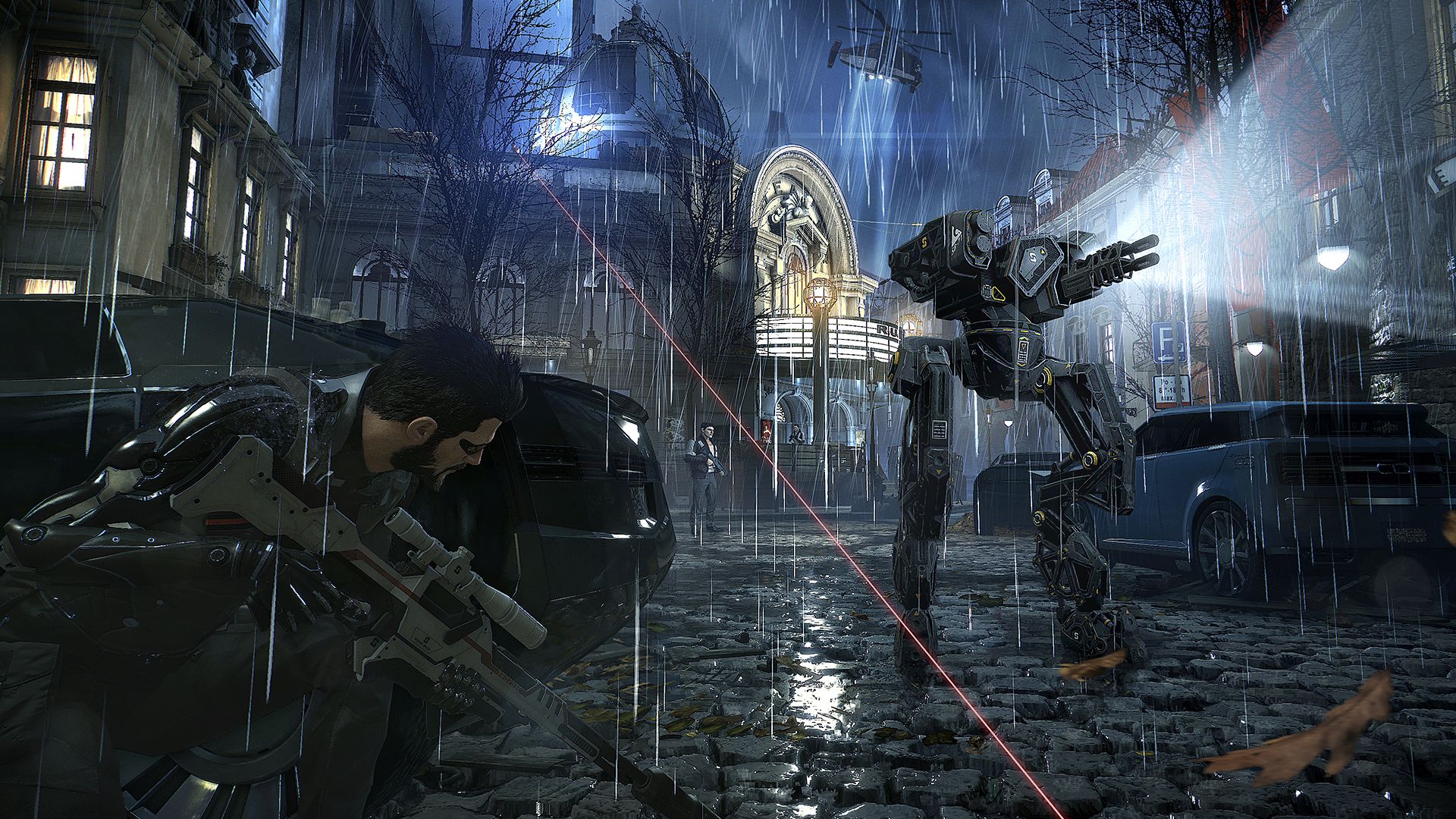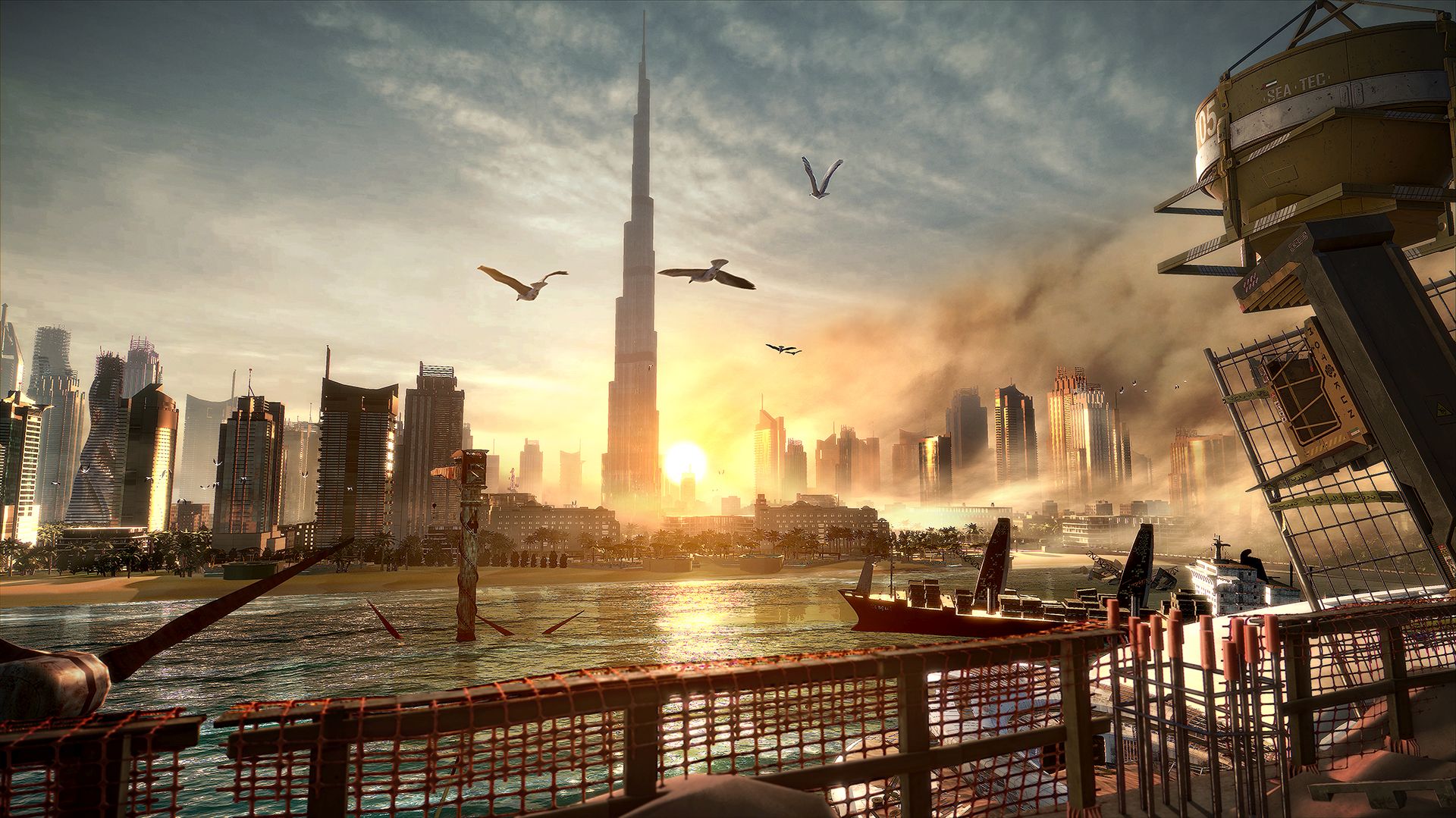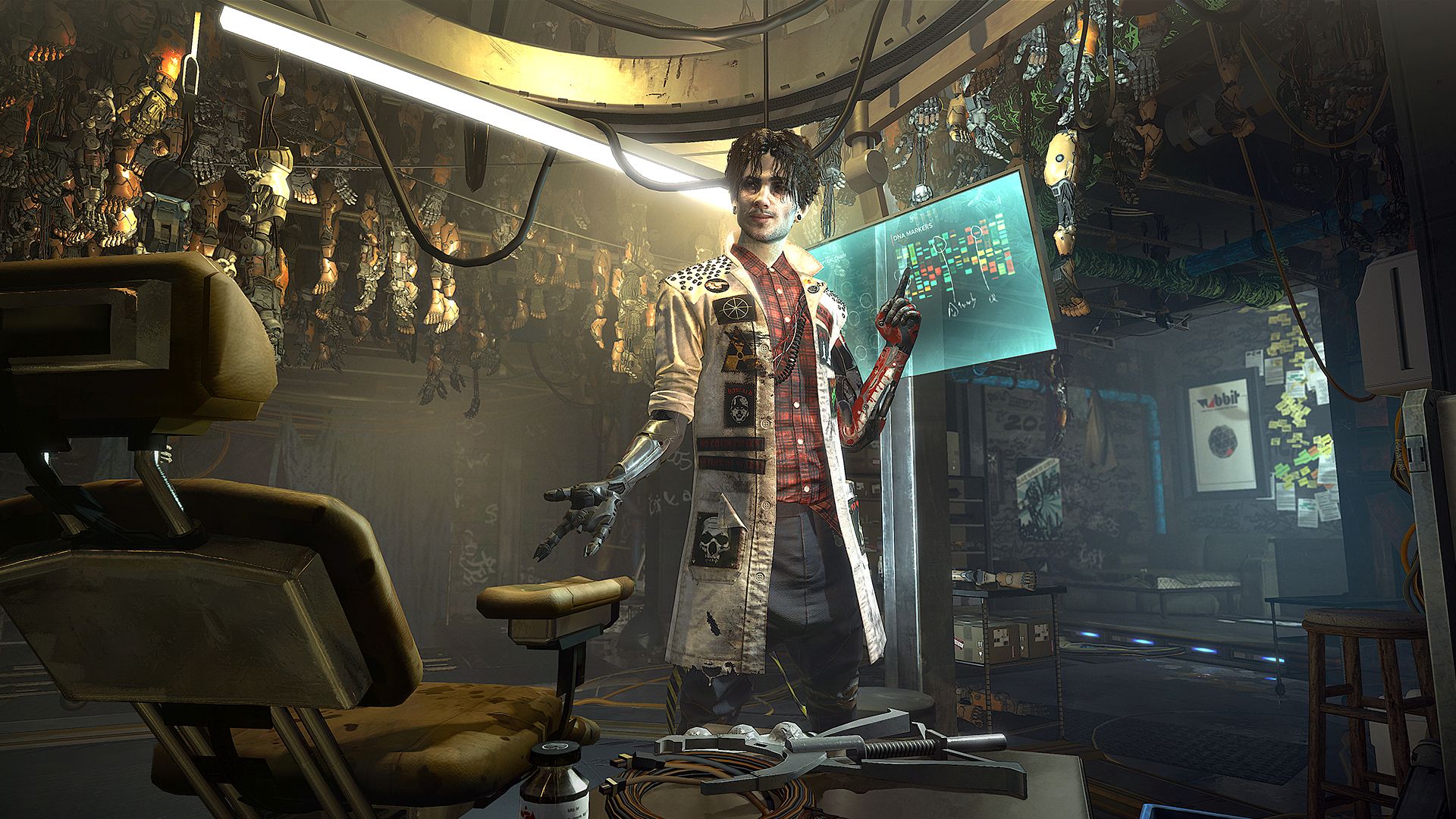Mankind Divided is shaping up to be the best Deus Ex yet

I keep forgetting I'm superhuman. Toward the end of Deus Ex: Mankind Divided's tutorial mission, set in hot, dusty Dubai, I emerge on the top level of a huge multi-storey atrium. A couple of gangs are doing an arms deal on the ground level far below. As a special forces operative working for Interpol, it's my job to get down there and break it up.
Stupidly, I call the elevator. After about ten seconds of waiting politely I remember I'm Adam goddamn Jensen, a bionic commando with a heart of plastic, fists of metal, and catwalk-approved shades melded into my skull. Adam goddamn Jensen does not take elevators. I take a run up and jump over the edge as a sandstorm blasts in. After a few seconds of freefall the Icarus Landing System kicks in, the view pops into third person, and Jensen's fall is cushioned by a bubble of crackling golden light. God, I love Deus Ex.
In Human Revolution the fancy landing would put my other abilities out of commission for a while. Human Revolution was two things: a great immersive sim set in exactly the sort of cyberpunk dystopia that I want to explore in games, and a hardcore snacking simulator. Want to punch a guy with your metal death hands? Eat an energy bar. Three seconds of cloak? Have another energy bar. The energy bar—the handy snack that lets you attack—is now a sort of battery cell, and you won't have to consume them anywhere near as often.
Instead of the old energy pip system, which consumed one of your pips whenever you used an augmentation, Jensen now has an energy pool. Activating an ability deletes a chunk of it. If it's a sustained ability like cloak, what remains of the bar will be temporarily drained, but then recover a few seconds later. The lowest chunk of the bar can never be permanently depleted. That means a spree of chained abilities will limit your options (until you crunch an energy cell), but you've always got a little left in the tank to play with.

This means Jensen can punch more than one or two people (brutal third-person close combat takedowns are back, by the way, and as satisfying as before). It also means you can chain augs together, or use them simultaneously. The excellent Icarus Dash electrically propels you forward at great speed, which is ideal for quick traversal, and for suddenly KO-ing very surprised men. Combine it with the silent movement aug and you've got a great stealth tool. Alternatively, use it to get into a group of enemies and activate Jensen's spinning typhoon attack to spray the area with bombs.
This makes Jensen very powerful, but he should be. Dishonored shows that in sandbox sims, it's better to be a little overpowered and have lots of options. A clever rethink of the augmentation system gives you those options. Many augs now have lethal and non-lethal variants, or can be used in different ways to suit lethal and non-lethal players. The typhoon attack can be altered to scatter gas grenades instead of warheads. Your retractable arm-chisels can now be fired at enemies to impale them at range (or blow them up, if you charge the shot). Or you can use them to create a noisy distraction. Choosing a playstyle no longer limits you to a small subsection of Jensen's abilities. That means you have more ways to tailor your own approach, and that's what Deus Ex is all about.
The level design supports that too, of course. Dubai was a relatively linear mission designed to teach crouching, jumping, punching and elevator-calling. The dark, rainy Prague level I also played was a more traditional Deus Ex area. Eidos Montreal walled off one corner of a much larger hub and invited me to infiltrate a theatre occupied by a criminal gang.
Keep up to date with the most important stories and the best deals, as picked by the PC Gamer team.
There are many ways in. A series of ladders lead to the rooftop (I killed a sniper, took his gun and cleared out the lobby from street-level in one playthrough). There's a vent up there that drops you deep into the building. You can walk in through the front door if you want to fight. An open window presents a quieter route. I thought it would be remiss of me not to find a way to get in by stacking boxes, so I used a construction platform to carry a huge box onto a ledge, and then put it on top of another huge box to find another way up to the rooftop. Then I reached back and picked up the box, so I could throw it at a guard.

Once inside I had plenty of fun messing up the guards, luring them into the toilets and tranquilising them, creating distractions and cloaking around them. It's now much easier to change your approach mid-mission. You can modify your guns to add or remove scopes, silencers and laser targeting systems without dipping into a menu screen. You can now hack some devices at range with the right upgrades, which means you can use it in the middle of a firefight. Complete a quick rhythm task and your target, whether a security camera or a guard bot, is temporarily disabled.
For more complex devices like workstations you need to beat a prettier version of Human Revolution's node-capture minigame. This gets you into people's emails, which are full of background lore, jokes, and the occasional door code. There are new storytelling devices, too. In the middle of the theatre I stopped to watch an entire news report presented by returning news anchor Eliza Cassan. Human Revolution fans may detect the merest hint of biased reporting here.
There will be a lot more talking throughout the game. The team have used more than a hundred voice actors for Mankind Divided. The new engine doubles the number of NPCs that the team can put on screen, which ought to help hub areas feel livelier than HR's, though Eidos Montreal hasn't shown those yet.
It certainly looks better. The Dawn engine is a heavily modified version of IO's Glacier engine, and it allows for far more detail than Human Revolution. It also supports lots of clutter, much of which can be picked up and thrown to cause distractions. Prague and Dubai looked and felt completely different, one wet and grimy, the other arid and airy. The removal of Human Revolution's gold filter allows the team to create places that feel more varied, though the neat cyber-renaissance style of HR—triangles, lovely coats, the occasional ruff—thankfully remain. It still feels like Deus Ex, but with all of Human Revolution's flaws addressed. It's going to be great.
Part of the UK team, Tom was with PC Gamer at the very beginning of the website's launch—first as a news writer, and then as online editor until his departure in 2020. His specialties are strategy games, action RPGs, hack ‘n slash games, digital card games… basically anything that he can fit on a hard drive. His final boss form is Deckard Cain.


